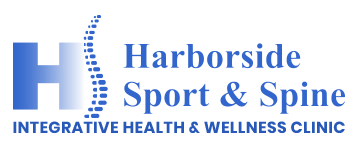TMJ Disorders: Symptoms, Causes & Treatment
Physical therapy exercises and techniques can strengthen jaw muscles and improve mobility, alleviating pain and dysfunction of TMJ disorders. Consult our board-certified Dr. David Sylvester, DC, at Harborside Sport & Spine if you or someone you know is suffering from TMJ disorders. For more information, contact us or book an appointment online. We serve patients from Jersey City, NJ, and surrounding areas.
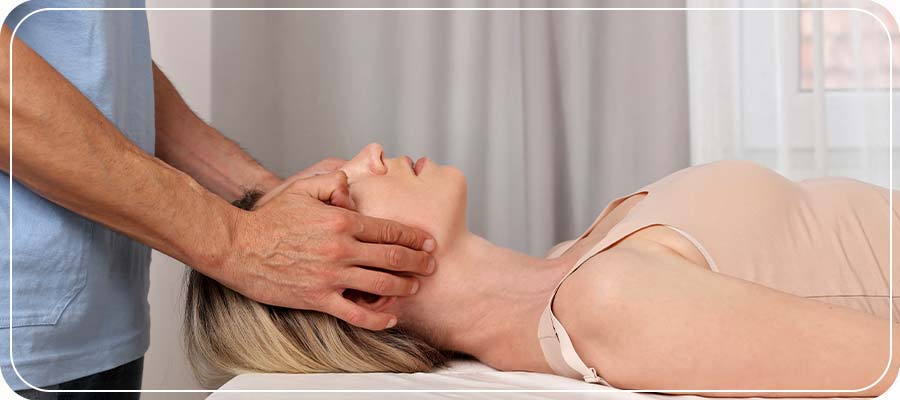
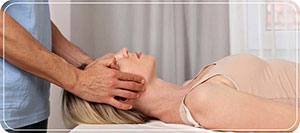
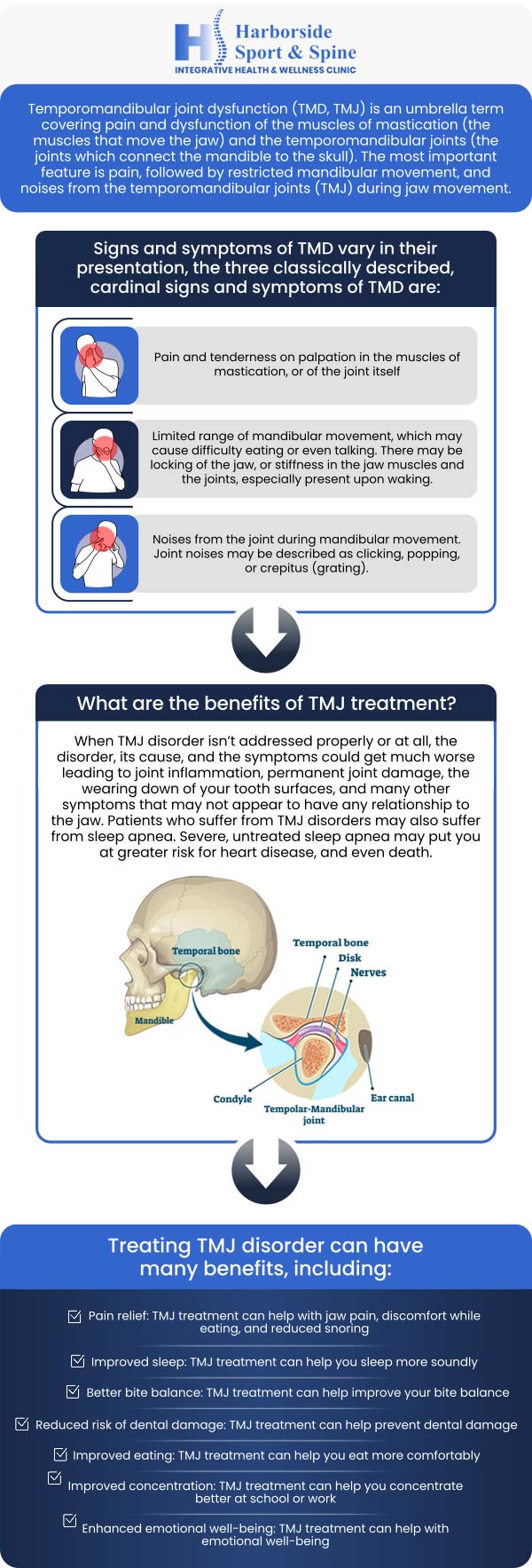
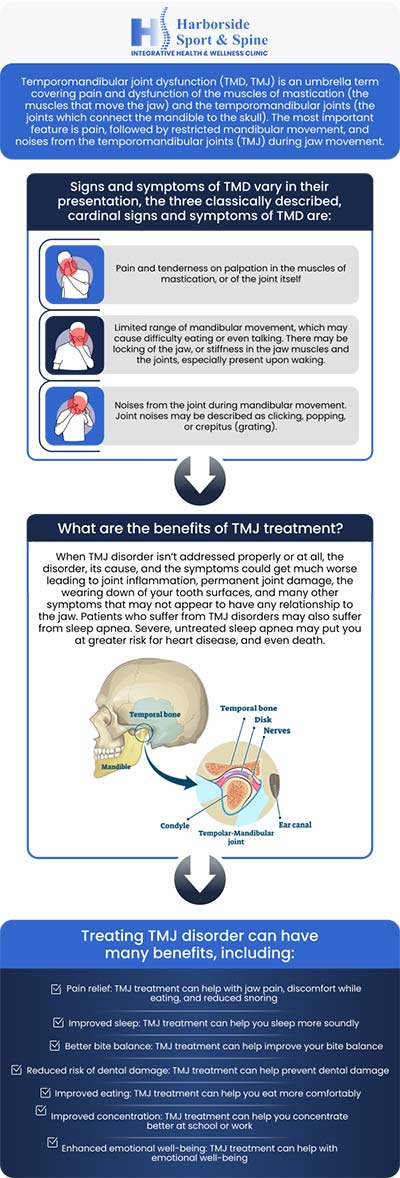
Table of Contents:
What is TMJ?
What causes TMJ disorders?
What are the symptoms of TMJ disorders?
How is TMJ diagnosed?
How can Dr. David Sylvester, DC, help you find relief from TMJ disorder symptoms?
TMJ stands for temporomandibular joint, which is the joint that connects the jawbone (mandible) to the skull. The TMJ is specifically located on the side of the head in front of the ear canal on both sides of the head and is what allows us to move our jaw downwards and upwards, side to side, and front and back.
The TMJ is a complex joint that consists of several components, including:
● The mandible (jawbone)
● The temporal bone (skull bone)
● The articular disc (a soft, rubbery tissue that separates the moving parts of the joint)
● The ligaments (tendons that connect the mandible to the temporal bone)
● The muscles (such as the masseter and temporalis muscles that move the jaw)
TMJ disorders can occur when there is an imbalance or misalignment in the joint, which can cause symptoms such as:
● Pain or tenderness in the jaw, face, or temple
● Clicking or locking of the jaw
● Difficulty opening or closing the mouth
● Grating or grinding sounds when opening or closing the mouth
● Swelling or inflammation in the face
Treatment for TMJ disorders may involve physical therapy, medication, or surgical interventions to realign the joint and relieve symptoms.
TMJ disorders can be caused by an array of different reasons. One of the most known common causes is dental issues, such as misaligned teeth or bite problems, which can put a strain on the TMJ. Additionally, grinding and clenching teeth, often due to stress, anxiety, or other habits, can also cause tension and pain in the TMJ.
Trauma to the jaw, face, or head, such as whiplash or a blow to the jaw, can also cause TMJ disorders. Poor posture, particularly forward head posture, can also put a strain on the TMJ by causing the jaw to be positioned forward of the ear canal. Age can also play a role, as the TMJ cartilage can break down over a period of time, which may lead to pain and stiffness.
Genetic factors also play a part in an increased risk of developing a TMJ disorder. Pregnancy hormones, menstruation, or menopause may also cause changes in the TMJ. Sleep disorders such as sleep bruxism (grinding or clenching during sleep) can also contribute to TMJ disorders.
The symptoms of TMJ disorders can vary from person to person, but common complaints include a clicking or popping sound when you open or close the mouth, pain or tenderness in the jaw, ear pain or ringing in the ears, headaches, facial pain or pressure, difficulty chewing or biting, and limited jaw movement. Some people may also experience a feeling of stiffness or locking in the jaw, or a sudden inability to open the mouth. Additionally, some people may experience symptoms such as tooth sensitivity, ear fullness, or difficulty swallowing. In some cases, TMJ disorders can also cause facial pain and swelling, as well as numbness or tingling in the face and lips.
TMJ disorders are typically diagnosed through a combination of physical examination, medical history, and imaging tests. The physical exam may also include a visual examination of the jaw and facial muscles, as well as palpation (feeling) for tenderness or abnormalities in the joint and surrounding tissues. The doctor could ask the patient to do some specific movements, like opening the mouth wide or clenching the jaw, to assess the range of motion and any pain or discomfort. Tests can also be used like X-rays, CT scans, or MRI scans to fully see the TMJ and surrounding structures and to rule out other conditions that may be causing symptoms. In some unique instances, a dentist or oral surgeon may also perform a comprehensive dental examination to rule out any dental-related issues that may be contributing to the TMJ symptoms. Make sure to contact your TMJ specialist if you have any concerns or worries.
TMJ disorders affect the temporomandibular joint, leading to symptoms such as jaw pain, clicking, headaches, earaches, and difficulty chewing. At Harborside Sport & Spine in Jersey City, Dr. David Sylvester, DC, offers non-invasive, personalized care to relieve TMJ-related discomfort and restore proper joint function.
Dr. Sylvester begins with a thorough assessment to identify misalignments in the jaw or cervical spine that may be contributing to your symptoms. Treatment may include gentle chiropractic adjustments, myofascial release, posture correction, and therapeutic exercises to reduce joint stress and muscle tension. At Harborside Sport & Spine, care is tailored to your specific symptoms and underlying causes to provide both short-term relief and long-term stability.
Many patients notice reduced jaw tension, fewer headaches, and improved jaw movement within weeks. For more information, contact us today or book an appointment online to explore your treatment options and start your journey to a more active, pain-free lifestyle. We serve patients from Jersey City NJ, Hoboken NJ, Weehawken NJ, West New York NJ, Guttenberg NJ, Secaucus NJ, Harrison NJ, Kearny NJ, Newark NJ, Belleville NJ, Lyndhurst NJ, East Orange NJ, and Elizabeth NJ.
Check Out Our 5 Star Reviews

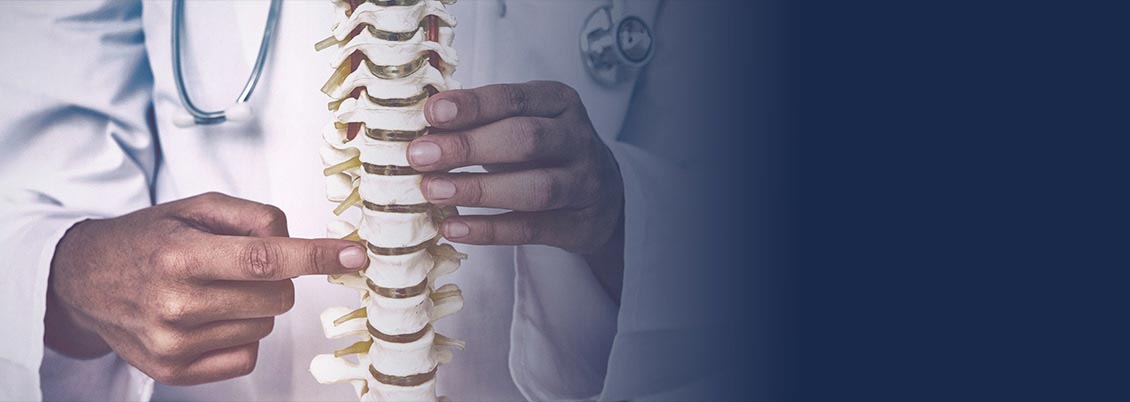
Chiropractic and Physical Therapy Services
▸ Chiropractic
▸ Physical Therapy
▸ Massage Therapy
▸ Acupuncture
▸ Spinal Decompression
▸ Prenatal Chiropractor
▸ Ear Infections
▸ Foot Pain
▸ Headaches
▸ Scoliosis
▸ Slipped Disc
▸ Sprained Ankles
▸ Stress
▸ Frozen Shoulder
▸ Osteoporosis
▸ Shoulder Pain
